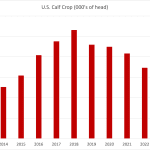By Glen Hallick, MarketsFarm
Glacier Farm Media MarketsFarm – Intercontinental Exchange canola futures were mostly lower on Wednesday, with the only gain coming in the deferred July position.
A trader said canola was due for a correction after spec fund short covering along with a good amount of farmer selling. He noted that farmers were likely spurred on to sell more today as to avoid the possibility of greater losses to come.
He said the trade is largely focused on canola’s yield potential. Once that has been surmised, he said attention will shift towards demand, of which that from exports has been waning.
Read Also
ICE canola shows little change
Glacier FarmMedia – Canola futures on the Intercontinental Exchange were relatively steady on Tuesday compared to their recent slump. Chicago…
Pressure on canola came from losses in Chicago soybeans and soyoil, plus those in Malaysian palm oil and European rapeseed. Small upticks in Chicago soymeal and modest increases in crude oil tried to put a lid on further declines among the oilseeds.
The Bank of Canada announced an interest rate cut of 25 basis points at 4.5 per cent. That weighed on the Canadian dollar, which by mid-afternoon Wednesday the loonie slipped to 72.39 U.S. cents compared to Tuesday’s close of 72.63.
There were 56,065 contracts traded on Wednesday, compared to the 59,999 contracts that changed hands on Tuesday. Spreading accounted for 18,236 contracts traded.
Prices are in Canadian dollars per metric tonne:
Price Change Canola Nov 670.60 dn 7.80 Jan 675.10 dn 7.70 Mar 677.90 dn 6.00 May 676.00 dn 3.30
SOYBEAN futures at the Chicago Board of Trade were weaker on Wednesday, as the weather outlook was favourable.
The United States Midwest is forecast to see some heavy precipitation by next week, while temperatures are to remain well above 35 degrees Celsius. The driest areas of the Midwest are parts of Iowa, Kansas and Missouri.
Brazil exporter group Anec projected the country’s July soybean exports at 10.43 million tonnes plus soymeal exports of upwards to 2.40 million tonnes.
Indonesia said it will replace B35 biodiesel with a new B40 blend that’s 40 per cent palm oil. The new blend has been tested on trains and will soon be tested on agricultural machinery, power plants and shipping.
A report said India’s edible oil imports are projected to hit a record 1.92 million tonnes in July, up 26 per cent from June. Imports of palm oil and soyoil have increased 45 per cent, with the former at 1.14 million tonnes and the latter at 400,000 tonnes.
CORN futures were slightly higher on Wednesday, caught between pressure from soybeans and a little bit of support from wheat.
The U.S. Energy Information Administration reported ethanol production averaged slightly below 1.10 million barrels per day, up 11,000 BPD. Ethanol stocks increased by 563,000 barrels at 23.70 million.
The European Union said its corn imports rose 39 per cent so far in 2024/25 at 1.42 million tonnes.
Ukraine reported its grain exports were up 67 per cent so far in 2024/25 from a year ago at 2.78 million tonnes, of which half was corn.
WHEAT futures were mixed on Wednesday, with gains for Chicago and Kansas City while Minneapolis was lower.
After the first day of examining fields, the Wheat Quality Council tour placed its findings of spring wheat yields in North Dakota at 52.3 bushels per acre compared to 48.3 a year ago. That would be the best yields since 1994.
The EU said its soft wheat exports fell 35 per cent so far in 2024/25 at 1.44 million tonnes. However, the EU noted that data from France was incomplete.
Ukraine’s wheat exports so far into 2024/25 reached 994,000 tonnes and those for barley hit 380,000 tonnes.
Jordan issued a tender for 120,000 tonnes of milling wheat.








